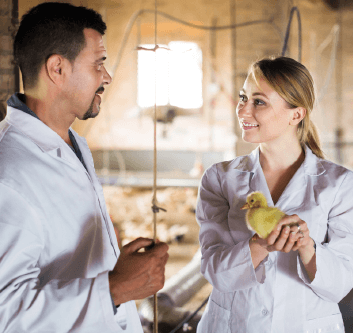Overview
Research and advisory role that advises on raw material product selection, maintenance feeding programs and modification of diets to meet certain desired outcomes.

What responsibilities will I have?
- Frequently observe animals’ behavior and eating habits
- Understand current feed rations and nutritional value
- Get to know the farm and the ultimate end use for the animals to better formulate a diet for them
- Educate farmer and employee on appropriate diets, product mix, dietary planning and preparation of fodder or food to treat an illness or disease and/or to enhance and maintain optimum health performance
- Determine performance benchmarks and process as defined by regulatory and company policies
- Conduct and evaluate dietary studies and other fodder, food and nutrition-related research
- Monitor aspects of feed manufacturing and quality control
- Advise on product development and marketing strategies and provide nutritional information to consumer market
- Monitor aspects of feed manufacturing and quality control
- Research alternative raw product inputs for desired minimum nutritional results
- Assist in keeping records of anti-biotics, medicines etc.
What education and training is required?
A bachelor’s degree in animal science, poultry science or other related field is required. A masters degree in animal nutrition may be required for some roles.
To pursue a career as a herd nutritionist:
The following high school courses are recommended: agricultural education, mathematics, anatomy, biology, chemistry and computer courses.
Where can I work?
Depending upon the animal you may work for a cooperative, veterinarian, a feed company or independently.
Future Job Market / Outlook
The future outlook for a herd nutritionist will be good over the next five years.
Suggested Professional Organizations and Associations
- Animal Nutrition Association
- American Association of Swine Practitioners
- American Poultry Association
- American Society of Animal Science
